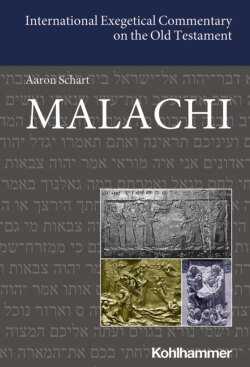Malachi

Реклама. ООО «ЛитРес», ИНН: 7719571260.
Оглавление
Aaron Schart. Malachi
Inhalt
Editors’ Foreword
Author’s Foreword
Introduction. Malachi in the Canon
The Text of the Malachi Document
The Greek Translation
Poetic Analysis of the Malachi Document
Disputation Speech (Contentious Refutation)
Structure of the Writing
The Document’s Origins
Primary stratum
Incorporation into the Book of the Twelve Prophets
The Malachi Document as the Final Section of the Book of the Twelve Prophets
Completion of Thematic Lines
Malachi among the Nebiim in the Canon
Reception in the New Testament
The Historical Situation of the Malachi Document
Ideas about God in the Malachi Document
Malachi 1:1. Superscription. Translation
Notes on Text and Translation
Synchronic Analysis
Diachronic Analysis
Summary Interpretation (Synthesis)
Malachi 1:2–5. Love for Jacob, Hatred for Esau. Translation
Notes on Text and Translation
Synchronic Analysis
Diachronic Analysis
Historical Location
Summary Interpretation (Synthesis)
In the Context of the Book of the Twelve Prophets
Reception in the New Testament
Theological Relevance
Malachi 1:6–2:9. Worship without Reverence for God. Translation
Notes on Text and Translation
Synchronic Interpretation
Malachi 1:6abα: The Thesis
Malachi 1:6bβ, 7–12: Yhwh’s Table and Altar are Neglected
Malachi 1:11–12: The Nations’ Positive Attitude
Malachi 1:13–14: “Weariness”
Malachi 2:1–4a: Priestly Service is not being performed “from the heart.”
Malachi 2:4b–8: Corruption of the Covenant with Levi
Malachi 2:9: Conclusion of the Word of Judgment
Diachronic Interpretation
The Disputation Speech: Malachi 1:6–14
Proclamation of Punishment: Malachi 2:1–4a, 9
The Historical Retrospect: Malachi 2:4b–6, (7), 8
Hypothesis of Origins
Redaction History
Historical Location
Summary Interpretation (Synthesis)
In the Context of the Book of the Twelve Prophets
Reception in the New Testament
Theological Relevance
Malachi 2:10–16. Faithless Actions. Translation
Notes on Text and Translation
Synchronic Analysis
Diachronic Analysis
Historical Background
Summary Interpretation (Synthesis)
In the Context of the Book of the Twelve Prophets
Reception in the New Testament
Theological Relevance
Malachi 2:17–3:5. Violation of the Law. Translation
Notes on Text and Translation
Synchronic Analysis
Diachronic Analysis
The Socio-Cultural Location of the Primary Layer
Summary Interpretation (Synthesis)
In the Context of the Book of the Twelve Prophets
Reception in the New Testament
Theological Relevance
Malachi 3:6–12. Keeping Nothing Back from God. Translation
Notes on Text and Translation
Synchronic Interpretation
Diachronic Analysis
Historical Situation
Summary Interpretation (Synthesis)
In the Context of the Book of the Twelve Prophets
Reception in the New Testament
Theological Relevance
Malachi 3:13–21 [3:13–4:3 ET] Justice for Those Who Revere Yhwh. Translation
Notes on Text and Translation
Synchronic Analysis
Diachronic Analysis
Historical Location
Summary Interpretation (Synthesis)
In the Context of the Book of the Twelve Prophets
Reception in the New Testament
Theological Relevance
Malachi 3:22–24 [4:4–6] The Sending of Elijah. Translation
Notes on Text and Translation
Synchronic Analysis
Diachronic Analysis
Historical Location
Summary Interpretation (Synthesis)
Context in the Book of the Twelve Prophets
Reception in the New Testament
Theological Relevance
Bibliography
Indexes. Index of Hebrew Words
Index of Key Words
Index of Biblical Citations. Genesis
Exodus
Deuteronomy
Ezra
Nehemiah
Psalms
Proverbs
Isaiah
Jeremiah
Ezekiel
Hosea
Joel
Amos
Micah
Nahum
Zephaniah
Haggai
Zechariah
Malachi
Matthew
Mark
John
Romans
1 Corinthians
Plan of volumes
Отрывок из книги
This commentary proceeds by first offering a synchronic view of the canonical final text of Malachi, especially the argumentation in the disputation speeches. Then the history of the text's origins is reconstructed, revealing an originally independent collection of disputation speeches. The additions provide some precision, introduce motifs from other writings, or accommodate the text to changing historical frameworks. In a third move the reader's view is directed beyond the Malachi document itself: as the last writing in the Book of the Twelve Prophets, Malachi refers back to other prophetic writings. The New Testament in turn adopts sayings from Malachi and develops them further. Finally, Schart investigates the theological relevance of the book.
Professor Aaron Schart teaches Old and New Testament at the University of Duisburg-Essen.
.....
– The call to repentance in Mal 3:7 belongs with the same expression in Zech 1:3.
– The judgment of purification in Mal 3:2–3 extends Zech 13:9.
.....